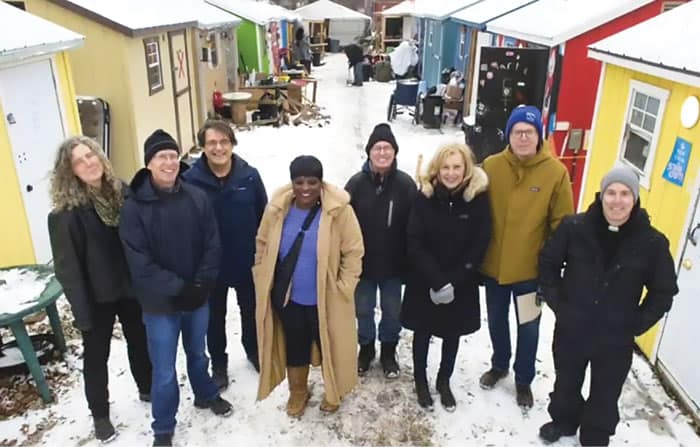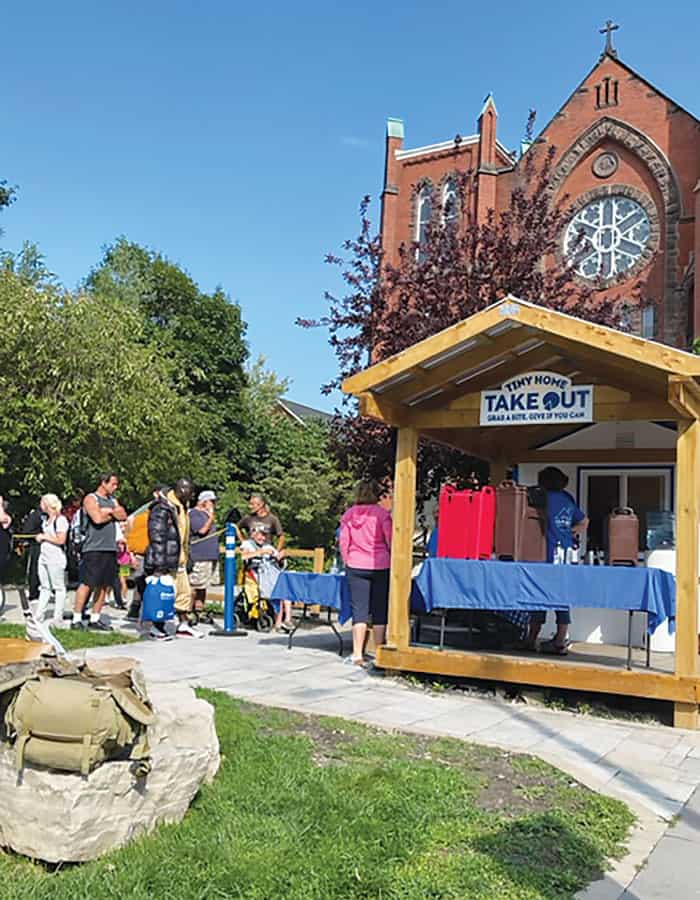A parish in Ontario, Canada, finds creative ways to care for people experiencing hunger and homelessness
St. Mary Our Lady of the Seven Sorrows parish in Kitchener, Ontario, is an example of what Pope Francis surely had in mind when he spoke about the Church as a field hospital.
Conducting a Maryknoll mission appeal recently at St. Mary’s, I was struck by its vibrantly diverse congregation and beautifully maintained church, located in the heart of downtown. I was even more impressed by how the parish takes to heart the words of dismissal at Mass: “Go in peace, to love and serve the Lord.”
Five nights a week, the parish opens its Tiny Home Takeout program. From an 8-by-10-foot shed — a “tiny house” — a team of staff and volunteers serve 300 restaurant quality takeout meals. Calzones, pizzas or sandwiches, along with a “daily bite” (usually a salad in the summer or a hot casserole or soup in the winter), are packaged to go.
Those who can afford to do so are invited to make a donation, but the meals are especially intended for people experiencing homelessness. “Whether you’re living on the street, squeezing your grocery budget to pay the bills, or living a middle-class life, Tiny Home Takeout is happy to feed you and your family,” reads its program description.
The genesis of this creative and compassionate outreach effort was an unexpected early November snowstorm in 2019. Most of the city’s unhoused people, as well as the city’s service organizations, were unprepared for the early extreme weather.
Area churches were asked if they might provide temporary shelter. A group of dedicated parishioners and St. Mary’s pastor, Resurrectionist Father Toby Collins, said yes. They opened the parish hall and welcomed unhoused people into the warmth of the parish.

Staff and board members, including Resurrectionist Father Toby Collins (far right) serve at A Better Tent City in Kitchener, Ontario. The project is supported by its community partners such as St. Mary Our Lady of the Seven Sorrows. (Courtesy of Toby Collins/Canada)
Father Collins and the parishioners soon realized that their guests could benefit from nutritious food and the fellowship that can accompany it. They invested in a full commercial kitchen and hired Chef Amy Cyr. The tiny house was set up next to the church for distributing the meals.
A woman who received help expressed her appreciation with these words: “This means love, it means being family together. This is where Jesus would come, to people like us.”
Around that time, tiny houses were being introduced in the Kitchener area in another way to help people experiencing homelessness.
Many of the area’s unhoused people were staying in tents on vacant corner lots, Father Collins explains. They faced precariousness and danger in these random, informal encampments.
Along with many other community partners, St. Mary’s joined A Better Tent City (ABTC). This project replaces tents and other makeshift shelters with well-built tiny houses in a safe, supportive setting.
The 42 tiny houses, which are wired with electricity for heat and light, are grouped around larger structures with facilities for showering, washing laundry and cooking.
Approximately 50 residents live in ABTC. The neighborhood-like model provides safety and the opportunity for community among residents — and at the same time, respect for their privacy and individuality.

The Tiny Home Takeout of St. Mary Our Lady of the Seven Sorrows parish in Kitchener, Ontario, is open five days a week and serves meals to go. (Penny Laurette/Canada)
“It provides them a lot of dignity. It gives them their own homes where they can put in shelves, and customize, and paint,” says Father Collins, who serves as secretary for ABTC’s board of directors.
“It’s also a tool that brings other volunteers in,” he continues. “People say, ‘I want to do something about homelessness.’ This gives them points [of contact].”
Food Bank of Waterloo Region makes weekly deliveries and the Sanguen Health Center mobile unit visits regularly. Drug management and treatment services are provided on-site. Costs are covered through donations, the support of businesses and community partners, and collaboration with local and state departments and agencies. “Everybody helps,” Father Collins says.
“We still face challenges,” states the A Better Tent City website. “Living in an 8’x10’ cabin is not the solution to the homelessness crisis.” Residents have complicated needs: unemployment, substance abuse, physical and mental health issues. And as successful as the project may be, it is not a substitute for permanent housing.
“We cannot cure homelessness,” the website adds. “But we can make a difference in the lives of 50 people.”
The value of this powerful witness of service at the Tiny Home Takeout and A Better Tent City is strong. It is present among the volunteers who help out and the recipients who benefit. It is present in each takeout meal served and in each tiny house inhabited. These buildings are small, but their impact is huge because of the enormous love being shared.
The joy of the Gospel can clearly be seen through the ministries of St. Mary Our Lady of the Seven Sorrows parish. Pope Francis would be pleased.
Featured image: A resident of A Better Tent City in Ontario, Canada, stands outside a tiny house. The project offers shelter, privacy and community to people experiencing chronic homelessness. (Courtesy of Toby Collins/Canada)
![]()
